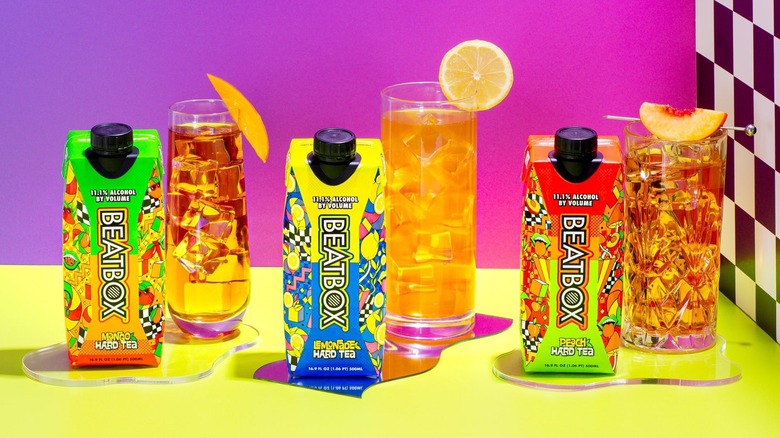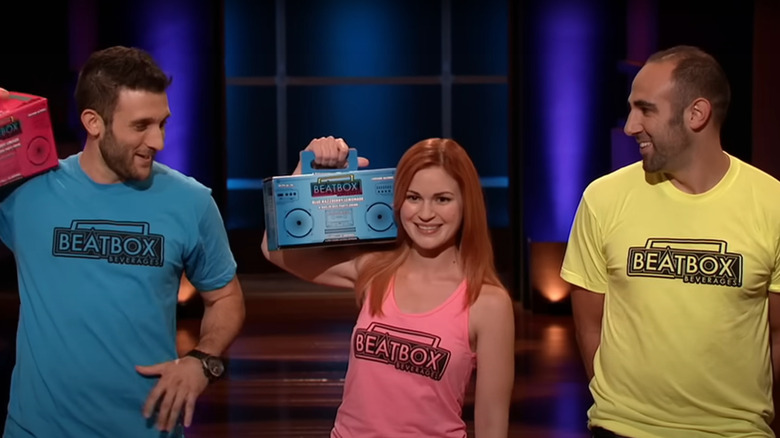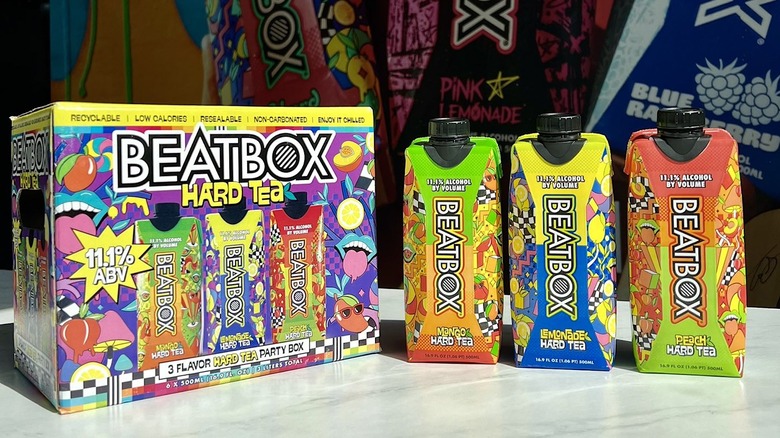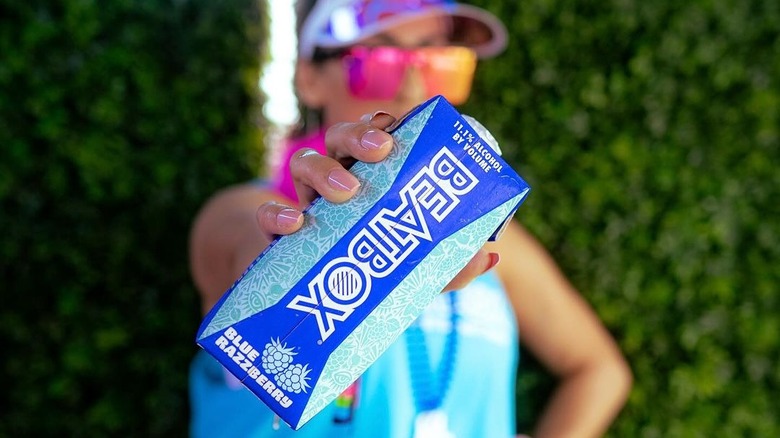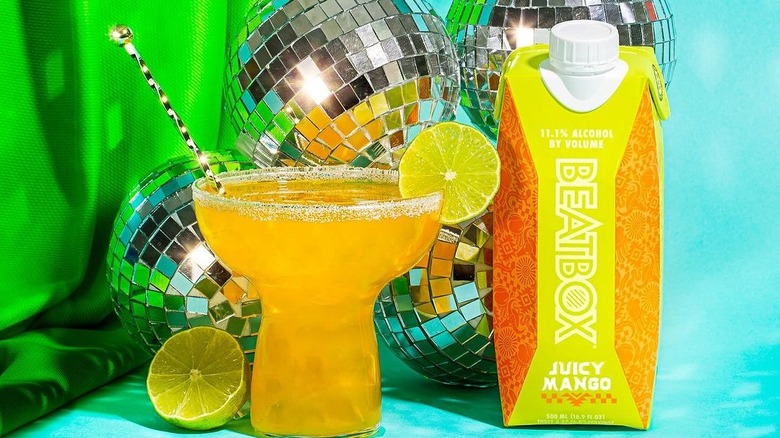BeatBox Beverages: Here's What Happened After Shark Tank
When BeatBox Beverages appeared on "Shark Tank" back in October 2014, the goal was simple yet daringly ambitious: to "change boxed wine forever" (via YouTube). Co-founders Justin Fenchel, Aimy Steadman, and Brad Schultz from Austin, Texas wanted to provide something very different from the boxed wines available in stores, so they set about making their own beverage.
The trio came up with their original idea in 2011 when they mixed up a simple homemade punch while they studied for MBAs in Entrepreneurship. Made with vodka and Crystal Light and decanted into upcycled bags for serving, the friends wanted to create a fun drink for people to bring to parties, music festivals, and outdoor events. Their large-format Party Punch proved so popular they started selling it, and by the time they graduated from business school in 2013, BeatBox Beverages was ready to launch as a proper business.
Though they had no real experience in the alcohol industry, Fenchel, Steadman, and Schultz pooled together their own savings of around $55,000 along with some help (in the region of $150,000) from families and friends to make their product, which had evolved into a flavored mixed drink made from an orange wine base. The following year, they headed to "Shark Tank" seeking $200,000 for a 10% stake in their boxed beverage business.
What happened to BeatBox Beverages on Shark Tank
Justin Fenchel, Aimy Steadman, and Brad Schultz presented their colorful BeatBox bag-in-a-box beverages to the Sharks as more of an experience than just a drink. Designed to be shared by partygoers, the drinks, which packed almost seven bottles of wine into each stereo-shaped box, came in a variety of flavors designed to appeal to a younger demographic, including blue 'razzberry' lemonade, and cranberry limeade with an ABV of 11.1%. They had made $235,000 in sales within the first 14 months of operating. The Sharks sensed an opportunity.
Barbara Corcoran offered $400,000 for a 20% stake in BeatBox — while Kevin O'Leary, with experience in the wine industry, offered $200,000 for 20%. But Mark Cuban perhaps best grasped the intentions of the young company by noting: "You guys don't sell wine ... you guys sell fun" (via YouTube). He offered $600,000, three times what the entrepreneurs were seeking, but wanted 33% of the business in exchange.
BeatBox bravely countered Cuban's offer, asking if he'd raise it to $1 million for 33% which, as O'Leary noted, gave BeatBox Beverages a valuation of $3 million. Cuban agreed, and it was, at the time, one of the biggest investments in the history of the show. Incidentally, season six, in which BeatBox appeared, went on to prove successful for a single-serve wine, with Zipz Wine receiving an offer of $2.5 million.
BeatBox Beverages after Shark Tank
BeatBox Beverages saw a huge boost in sales for their five-liter bag-in-a-box Party Punch following their appearance on "Shark Tank." The $235,000 in sales before the show grew to $750,000 in the first year after the episode aired, co-founders Justin Fenchel, Aimy Steadman, and Brad Schultz revealed when they appeared on a "Beyond The Tank" update in 2022. 18 months in, they had launched in 26 states, and the product was available in Walmart.
But then things started to look less bright for the neon box creators. In 2016, sales were flatlining, and by 2017, BeatBox needed to look in a new direction. The main problem was that while you get a lot of glasses of wine in a single box — around 34 glasses in a five-liter version, like BeatBox was selling — it was simply too big for customers. The price point of $20 was too challenging to be sustainable.
BeatBox reacted to the challenge by launching individual roughly 17-ounce single-serve boxes in a variety of flavors, priced at under $5. Launched in 2018, the pivot proved popular, with sales doubling from $1 million to $2 million. In 2019, they doubled again to $4 million. By the time they appeared on the update show in September 2022, with the brand available in 40,000 retail spots, the company's sales stood at over $57 million since their original TV appearance.
Is BeatBox Beverages still in business?
BeatBox Beverages is not only still in business, but it's thriving. The presence of the brand is huge, both online and off. BeatBox sponsors music festivals, including Lights All Night in Dallas and Dreamstate Festival in Long Beach. And vibrant social media output sees the company regularly posting colorful content to 159,000 followers on Instagram, 100,000 on TikTok, and another 41,000 on X (formerly Twitter).
Justin Fenchel, Aimy Steadman, and Brad Schultz have also kept up with current drinks trends by launching a selection of different options for their single-serve boozy beverages, which come in recyclable containers. Party Punch and Hard Tea drinks are available with either a wine base or a malt base, with different ABV strengths ranging from 6% with zero sugar to 11.1% with six grams of sugar.
Many flavors have continued to flourish for the brand, too, with varieties currently including Fresh Watermelon, Peach Punch, Green Apple, and Juicy Mango. The Hard Tea range, which is brewed with real tea but is also a hefty 11.1% ABV, is available in lemonade, peach, mango, and plain tea. A party pack, ideal for taking to festivals, barbecues, or tailgates, offers six of the most popular flavored drinks in one box for under $60. Drinks are able to be served chilled, frozen, or mixed, further enhancing the options. And while boxed wines usually last between 12 to 18 months, Beatbox wines have a shelf life of up to three years.
What's next for BeatBox Beverages?
BeatBox Beverages has been sure from the get-go that there is always more potential to scale up, with the desire to become "the Red Bull of the alcohol industry" (via Forbes). And it's showing no sign of slowing down, whether by launching new flavored products or seizing new business opportunities and expanding availability.
The brand recently announced a partnership with the Dallas Mavericks professional NBA team and the Dallas Stars NHL team, which it hopes will help to double the sales of its drinks cases throughout 2024. And drinks sales in stores are also projected to expand. In 2022, BeatBox was sold in around 2,000 7-Eleven stores; its aim was to take it national, with 10,000 accounts across the country.
In total, BeatBox is now sold in over 65,000 different stores nationwide. And judging by a post on X, it looks as though BeatBox Beverages has visions for more bespoke and personalized catering options, too, such as drinks kits for bachelor or bachelorette parties, or even sponsored weddings. The opportunities look limitless for this young brand, who certainly have succeeded in changing boxed wine — both in terms of what's in the box, and how it's consumed.

